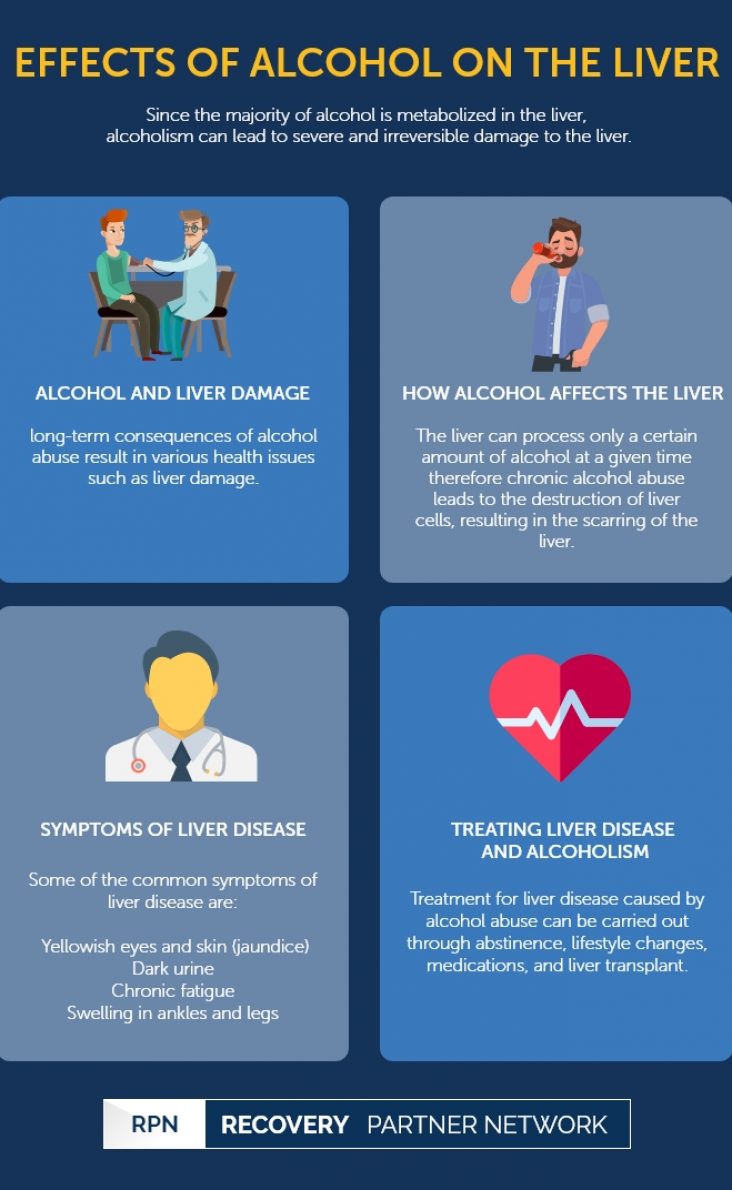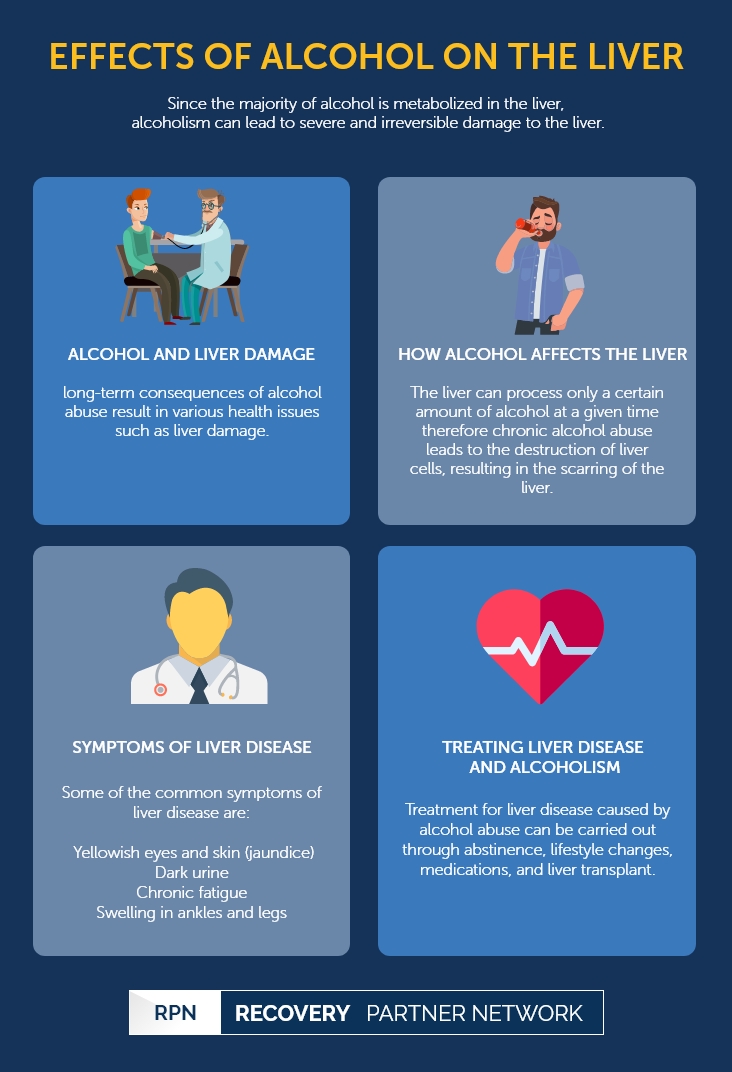Since the majority of alcohol is metabolized in the liver, alcoholism can lead to severe and irreversible damage to the liver.
Effects of Alcohol on the Liver
Alcohol and the Liver | Table of Contents
Alcohol and Liver Damage
Heavy drinking is described as men consuming 15 or more drinks per week and women consuming eight or more drinks per week. Generally, chronic alcohol abuse leads to various health issues, ranging from high blood pressure to stroke. Binge drinking is also a form of heavy drinking that generate adverse consequences such as physical and psychological impairments, as well as fatal overdose. However, the many research and studies contributed to the adverse effects, and long-term consequences of alcohol abuse have made the genal public aware of the dangers involved, especially the impact alcohol has on our liver.
FAQ
- Why is alcohol bad for your liver?
- Can your liver hurt from drinking?
- Do all heavy drinkers get liver damage?
- How quickly does your liver recover from alcohol?
During the process of alcohol breakdown, harmful and toxic by-products are produced in the liver. These substances damage liver cells and cause liver disease.
Alcohol hepatitis can cause inflammation, swelling, scarring, and the killing of liver cells. This condition can cause pain and tenderness in your abdomen.
Alcoholic liver damage does not affect all heavy drinkers. In fact, it only affects around 10-15 percent of heavy drinkers.
Certain alcoholic liver damage can be reversed if an individual stops drinking during the early stages of the disease. Depending on the damage caused by alcohol, the healing process may vary from days to several months.
How Alcohol Affects the Liver
The liver is responsible for breaking down and filtering harmful substances in the blood and manufacturing proteins, enzymes, and hormones that are used by the body to ward off common infections. In addition, it also:
- Converts nutrients, vitamins, and medicines into substances that are easily absorbed by the body
- Cleans the blood
- Produces bile for digestion
- Stores glycogen for energy
The body generally takes around an hour to process one standard alcoholic beverage. However, when the blood alcohol content of someone increases beyond a specific limit, it takes longer for the body to process alcohol. Since the liver can process only a certain amount of alcohol at a given time, when an individual consumes too much alcohol, the unprocessed alcohol keeps circulating through the bloodstream. This causes intoxication as the unprocessed alcohol starts to affect the heart and brain.
Chronic alcohol abuse leads to the destruction of liver cells, resulting in the scarring of the liver (cirrhosis), alcoholic hepatitis, and cellar mutation that may cause liver cancer. Generally, these conditions progress through the fatty liver to alcoholic hepatitis and then to cirrhosis. However, some chronic drinks may sometimes develop cirrhosis without first developing hepatitis.
According to the University Health Network (UHN), a person’s body weight, size, and gender determine how much alcohol is safe. Since women absorb more alcohol than men, they are more prone to liver damage. Nevertheless, consuming 2 to 3 drinks per day or binge drinking (consuming four or more drinks in a row) can damage an individual’s liver, regardless of the gender.
Combining alcohol with other medications, especially with acetaminophen such as Tylenol, can cause serious damage to the liver. Other medications such as antibiotics, sedatives, antidepressants, pain relievers, and muscle relaxants are also equally harmful when combined with alcohol. Thus, it is always crucial to talk to your doctor before taking any medications with alcohol simultaneously.
FAQ
- How much do you have to drink to cause liver damage?
- How do you know if alcohol is affecting your liver?
- What are the first signs of liver damage?
- How do you know if your liver is inflamed?
Men who usually drink more than 3 ounces of alcohol a day for more than ten years have the probability of developing cirrhosis. Women are at risk of liver damage if they drink about half as much as men.
There are many physical signs and symptoms to indicate the development of an alcoholic liver disease, such as jaundice, digestive issues, fatigue, and skin conditions such as eczema, itchiness, and psoriasis.
The initial signs of liver damage may include abdominal pain or tenderness, dry mouth, jaundice, fatigue, loss of appetite, and nausea.
Common signs of liver inflammation may include abdominal swelling, distention or bloating, fatigue, and the discoloration of urine and stool.
Symptoms of Liver Disease
Heavy drinkers retain a higher risk of developing a number of liver diseases in comparison to moderate drinkers. Almost 20 percent of heavy drinkers go onto develop fatty liver disease, although this condition is easily reversible with abstinence. Alcohol hepatitis, inflammation that causes liver deterioration, can also progress into cirrhosis that can be fatal. However, this condition is also reversible with abstinence.
Individuals who frequently abuse alcohol have a higher risk of developing liver diseases if they are genetically predisposed to liver issues or when exposed to infections.
Some of the common symptoms of liver disease are:
- Yellowish eyes and skin (jaundice)
- Dark urine
- Chronic fatigue
- Swelling in ankles and legs
- Bloody, pale, or tar-colored stool
- Loss of appetite
- Fever
- Disorientation
- The tendency to bruise easily
- Itchy skin
- Abdominal pain and swelling
- Nausea or vomiting
Liver disease caused by alcohol abuse is avoidable to a great extent. Most reputable sources cite moderate drinking as a great way to decrease the risks of liver disease. There is no specific type of alcoholic beverage, whether it be liquor, wine, or beer, that is comparatively safer for the liver.
Treating Liver Disease and Alcoholism
The first step to treating any alcoholic liver disease is to eliminate the consumption of alcohol. This can help rectify some of the early stages of liver disease. For example, abstaining from alcohol after being diagnosed with fatty liver disease can reverse the condition within 2 to 6 weeks. Thus, once an individual is diagnosed with alcoholic liver disease, it is imperative to quit drinking alcohol.
Some other conditions that are reversible with abstinence are:
- Alcoholic hepatitis
- Cirrhosis and liver cancer
Cirrhosis and liver cancer can be stabilized with abstinence but are case-by-case sensitive since they are usually fatal in instances of secondary complications such as kidney failure or hypertension in the vein that carries blood to the liver.
Conditions that are reversed through abstinence may return if one starts to resume drinking. Nevertheless, since it can be quite difficult to quit alcohol abruptly, it is highly advised to reduce the alcohol intake over a specific period gradually. Individuals who regularly consume alcohol over the recommended limits should not attempt to quit alcohol without medical support, as alcohol withdrawal is often life-threatening.
Lifestyle changes are necessary to treat alcoholic liver disease. For example, treatment specialists recommend reducing weight and quitting smoking to treat liver disease as being overweight and smoking has shown to worsen liver disease. Regularly consuming multivitamins is also highly recommended.
Certain medications such as corticosteroids or pentoxifylline are used to reduce inflammation in individuals with acute alcohol hepatitis while being treated at a hospital. Some other medications that are currently being studied for their potential in treating alcoholic liver diseases are:
- Probiotics and antibiotics
- Stem cell therapy
- Medicines that target the inflammation pathway
Liver failure refers to a condition where the liver loses all or most of its functionality. This can be a result of advanced-stage liver disease and often implies that a liver transplant is the last resort to prolong survival.
Under normal circumstances, a liver transplant is only considered for individuals who can abstain from alcohol for at least six months before surgery and those whose systems are healthy enough to undergo surgery. Nevertheless, a liver transplant is a complicated procedure that is highly dependent on the availability of donors. In addition, anti-rejection medications that are often prescribed after liver transplant can increase the risks of certain infections and cancers.
Liver transplants are usually the last resort. Alcohol abstinence and early treatment are the most viable methods to help increase an individual’s chances of reversing or slowing down the progress of liver disease.
Recovery Partner Network
We aim to educate and empower. If you feel our library of resources does not cover your specific need, reach out to us, and we would be happy to help.
STATISTICS
© Copyright 2026


